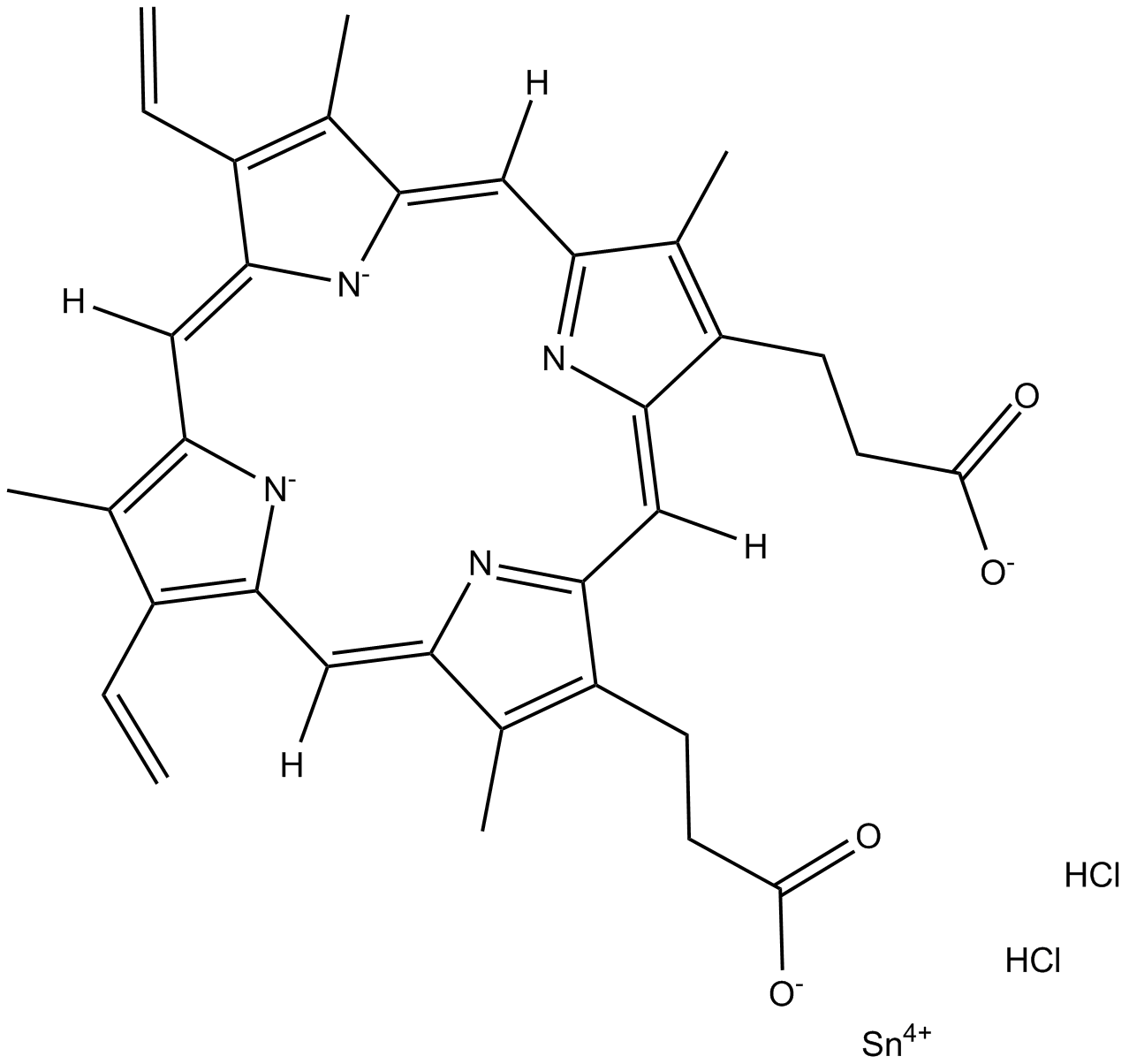Tin protoporphyrin IX dichloride (Synonyms: NSC 267099, SnPPIX) |
| Catalog No.GC10800 |
Tin protoporphyrin IX dichloride (SnPPIX) is a potent Heme oxygenase-1 (HO-1) inhibitor. Tin protoporphyrin IX dichloride (SnPPIX) sensitizes pancreatic ductal adenocarcinoma (PDAC) tumors to chemotherapy in mice model.
Products are for research use only. Not for human use. We do not sell to patients.

Cas No.: 14325-05-4
Sample solution is provided at 25 µL, 10mM.
Heme oxygenase (HO) converts protoheme to biliverdin, which in turn is enzymatically metabolized to bilirubin. While HO-2 is constitutively expressed, HO-1 can be induced by its heme substrate as well as by heavy metals, oxidizing agents, and other environmental stresses.[1],[2],[3] Tin protoporphyrin IX (SnPPIX) is a synthetic heme analog that selectively inhibits HO-1 (Ki = 11 nM) over HO-2 (IC50 = 7.5 µM).[4],[5] It also weakly inhibits endothelial nitric oxide synthase and soluble guanylyl cyclase (IC50s = 35 and 30 nM, respectively).[5] SnPPIX prevents hyperbilirubinemia in neonates by blocking HO-1 activity that increases postnatally.[4] It is rapidly cleared from plasma and persists in certain tissues, including kidney, liver, and spleen.[6] SnPPIX is commonly used as a tool to study the role of HO-1 activity in cells and in animals.[7[,[8]
Reference:
[1]. Kim, A.N., Jeon, W.K., Lee, J.J., et al. Up-regulation of heme oxygenase-1 expression through CaMKII-ERK1/2-Nrf2 signaling mediates the anti-inflammatory effect of bisdemethoxycurcumin in LPS-stimulated macrophages. Free Radical Biology & Medicine 49(3), 323-331 (2010).
[2]. Cable, E.E., Gildemeister, O.S., Pepe, J.A., et al. Mechanism of induction of heme oxygenase by metalloporphyrins in primary chick embryo liver cells: Evidence against a stress-mediated response. Molecular and Cellular Biochemistry 169, 13-20 (1997).
[3]. Surh, Y.J., Kundu, J.K., Li, M.H., et al. Role of Nrf2-mediated heme oxygenase-1 upregulation in adaptive survival response to nitrosative stress. Archives of Pharmacal Research 32(8), 1163-1176 (2009).
[4]. Drummond, G.S., and Kappas, A. Prevention of neonatal hyperbilirubinemia by tin protoporphyrin IX, a potent competitive inhibitor of heme oxidation. Proceedings of the National Academy of Sciences of the United States of America 78(10), 6466-6470 (1981).
[5]. Zakhary, R., Gaine, S.P., Dinerman, J.L., et al. Heme oxygenase 2: Endothelial and neuronal localization and role in endothelium-dependent relaxation. Proceedings of the National Academy of Sciences of the United States of America 93(2), 795-798 (1996).
[6]. Anderson, K.E., Simionatto, C.S., Drummond, G.S., et al. Tissue distribution and disposition of tin-protoporphyrin, a potent competitive inhibitor of heme oxygenase. Journal of Pharmacology and Experimental Therapeutics 228(2), 327-333 (1984).
[7]. Byun, S.J., Son, Y., and Pae, H.O. Cytoprotective effect of β-lapachone by inducing heme oxygenase-1 expression and AMP-activated protein kinase activation in human endothelial cells. Eur.Rev.Med.Pharmacol.Sci. 18(7), 949-958 (2014).
[8]. Zhang, M., Wang, S., Mao, L., et al. Omega-3 fatty acids protect the brain against ischemic injury by activating Nrf2 and upregulating heme oxygenase 1. Journal of Neuroscience 34(5), 1903-1915 (2014).
Average Rating: 5 (Based on Reviews and 26 reference(s) in Google Scholar.)
GLPBIO products are for RESEARCH USE ONLY. Please make sure your review or question is research based.
Required fields are marked with *




















